Comedy dates back to ancient Greek theater, making it a fundamental part of our culture. Playwrights, like Aristophanes, created comedies that highlighted social and political issues through humor. Shakespeare continued this tradition in the Elizabethan era with his joyful and touching comedies.
Vaudeville and silent films ushered in a new era of entertainment in the 19th and 20th centuries. Comedians such as Bob Hope and Lenny Bruce used laughter to challenge societal norms and expand boundaries. Fast forward to today, comedy has flourished, moving from sketch comedy shows to daring stand-up performances.
Key Takeaways
- Comedy has a rich history dating back to ancient Greek theater.
- Comedic performances have evolved over time, addressing social and political issues through humor.
- Stand-up comedy and vaudeville played a significant role in the popularization of comedy in entertainment.
- Boundary-pushing comedians like Lenny Bruce have pushed the boundaries of what was considered acceptable in comedy.
- Comedy continues to evolve, addressing social norms and controversies through various mediums, from sketch comedy shows to stand-up specials.
Ancient Greek Origins of Comedy
Comedy began in ancient Greek theaters. This lively form of theater became its own style thanks to playwrights like Aristophanes. He wrote plays filled with humor and boldness, inspired by satyr plays.
Aristotle, a famous philosopher, saw comedy as one of four key writing types. He described it as a way to show people who are not so great. Comedy makes us laugh, unlike tragic stories that make us sad or afraid.
Aristophanes and the Birth of Comedy
Aristophanes shaped ancient Greek comedy. He used jokes, satire, and making fun of others in his plays. Works like “The Clouds” and “Lysistrata” often teased powerful or important people.
“Comedy aims at representing men as worse, Tragedy as better, than in actual life.” – Aristotle
Also Read : The Top 9 American Universities You Should Consider Studying In
Aristophanes’ plays weren’t just for laughs. They also talked about what was going on in his city, Athens. By making fun of serious things, he pointed out their problems and lies.
What Aristophanes started still influences comedy today. It spread from the Greeks to places like Elizabethan England and our current stand-up comedy.
Comedy in Elizabethan Era and Shakespeare
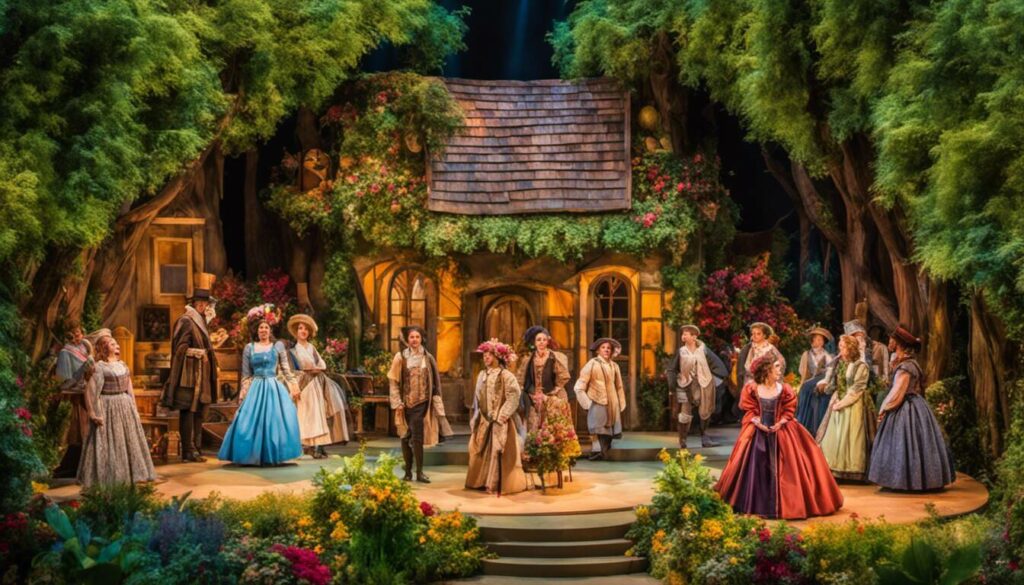
The Elizabethan era was a big time for comedy. This period saw a change in how comedy was seen. It became known for happy endings and a light feel, unlike the earlier serious plays. William Shakespeare played a major role in this. His works mixed smart dialogue, funny events, and a focus on love and marriage in Elizabethan comedy of manners.
Shakespeare wrote plays like “A Midsummer Night’s Dream” and “The Taming of the Shrew”. People loved these comedies for their complex stories and unforgettable characters. They also made fun of how the rich acted. This started the Elizabethan comedy of manners. Soon, romantic comedy became a favorite, making light of love’s mistakes in funny ways.
“All the world’s a stage, and all the men and women merely players.”
Back then, comedy became more popular than the sad plays of before. People wanted shows that were fun and entertaining. This trend showed a shift in what people liked to watch. The Elizabethan comedy era laid the foundation for comedy’s bright future. It prepared the ground for even funnier plays in later times.
Also Read : 3 Things You Should Know About Health Insurance: Ultimate Guide
The Evolution of Comedy Through Vaudeville

In the early 20th century, vaudeville was where comedy shined. It was filled with acts of funny songs, dances, and skits, often done by comedy teams. Yet, some like Frank Fay broke away with their own spontaneous comedy style.
Borscht Belt Comedians and Their Influence
The Catskill Mountains’ resorts, known as the “Borscht Belt,” were key in comedy’s growth. Here, Henny Youngman and others crafted witty monologues filled with jokes everyone knew. They won over audiences with their sharp humor and perfect timing.
These performers, known as Borscht Belt comedians, didn’t just perfect their art at small resort venues. They also changed comedy forever. Mixing ethnic jokes with quick gags, they laid the foundation for today’s stand-up comedy. This influenced how jokes are told by later comedians.
| Vaudeville Comedy Teams | Borscht Belt Comedians |
|---|---|
| Abbott and Costello | Henny Youngman |
| Burns and Allen | Sid Caesar |
| The Marx Brothers | Mel Brooks |
“I took a speed reading course and read ‘War and Peace’ in twenty minutes. It involves Russia.”
– Henny Youngman, master of the one-liner and a quintessential Borscht Belt comedian.
Also Read : What You Need to Know About Getting A Home Loan
Bob Hope and the Rise of Stand-Up Comedy
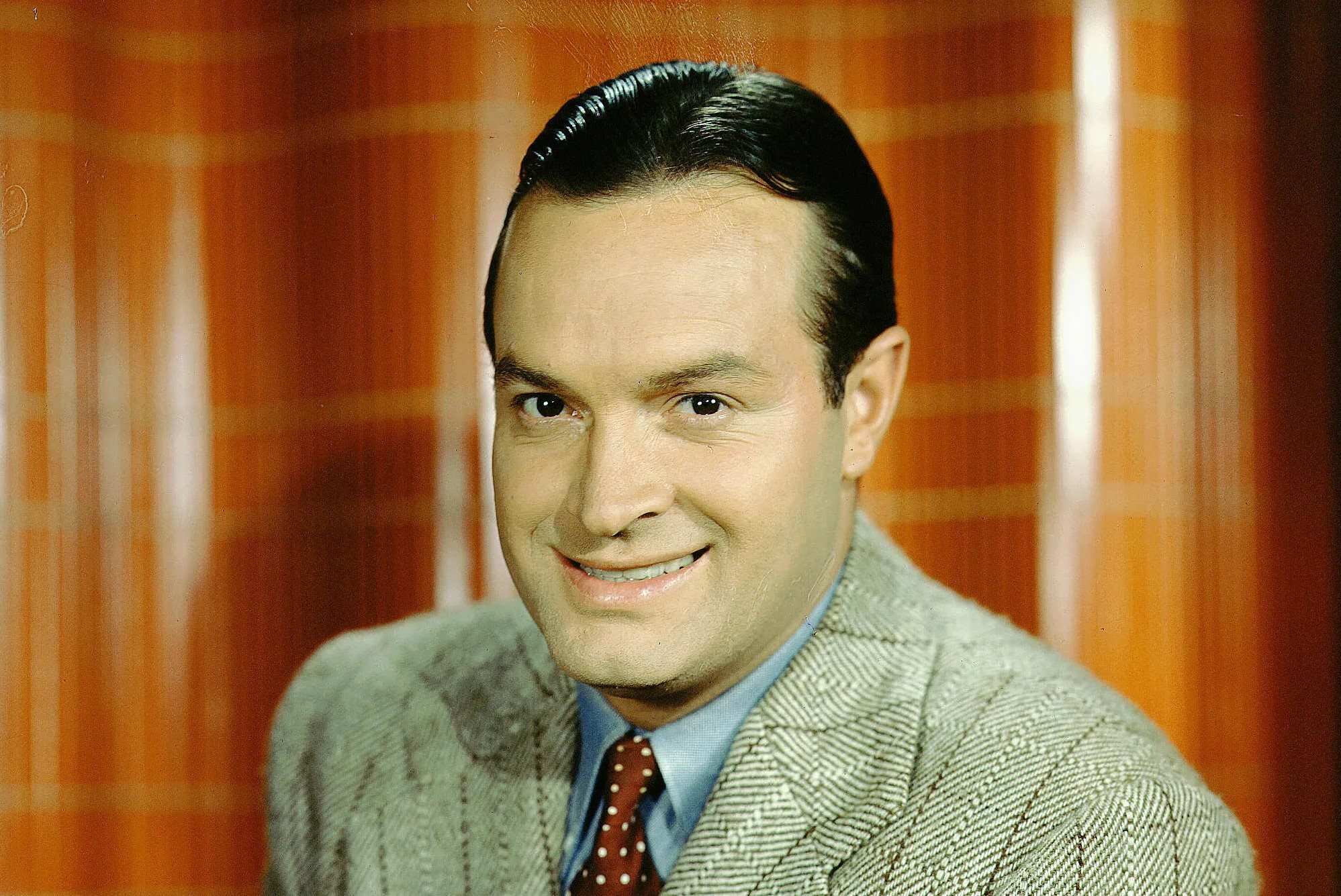
Bob Hope really changed the comedy world. He was from Britain but made it big in the U.S. His quick, funny style made stand-up comedy a big thing in America.
Other comics back then told simple jokes. But Hope’s jokes were about what was happening then, making them connect more. This along with his likable way won over the radio listeners when he started his show in 1938.
Hope’s style influenced many comedians after him. They loved how he mixed smart humor, funny observations, and thinking on his feet. People like Lenny Bruce and Mort Sahl followed in his footsteps, changing comedy in their way.
“Comedy is an amazing calling. You get to have fun and make a living. It’s not like you’re a brain surgeon, you know.” – Bob Hope
Bob Hope’s impact on stand-up comedy can’t be overstated. He showed how to be funny and interesting, becoming a source of inspiration for new comedians for years.
Also Read : The 5 Worst Mistakes That You Make When Selecting Health Insurance
The New Wave of Stand-Up Comedy

In the 1950s, a fresh group of stand-up comics broke through. They turned away from the old, lifeless ways of telling jokes. Among them was Mort Sahl, who critiqued political figures, society, and culture in a sharp way. He didn’t just tell jokes; he made people think.
His type of comedy found its place in the cool clubs of the Beat generation. These places were popular among younger people at the time. They became a source of inspiration for a whole new bunch of comedians. These comedians showed that humor could be clever, deep, and say something important about life.
Mort Sahl and Socially Engaged Comedy
Mort Sahl’s approach to comedy was a big change. Unlike others who used short jokes and punchlines, Sahl chose a more chatty, brainy style. He mixed humor with sharp observations on society, making audiences not just laugh but reflect on the world around them.
“Mort Sahl was the first comedian I’m aware of who went beyond classic joke-telling to engage with politics and social issues in a direct way.” – Comedian and writer, Jon Stewart
Sahl’s impact on comedy was huge. He cleared a path for a new kind of stand-up. These comics weren’t scared to talk about tough topics. This changed comedy for good, influencing how we see comedians and their role in society.
Also Read : The Best Universities in America for Freelance Professionals
Lenny Bruce and Pushing Boundaries
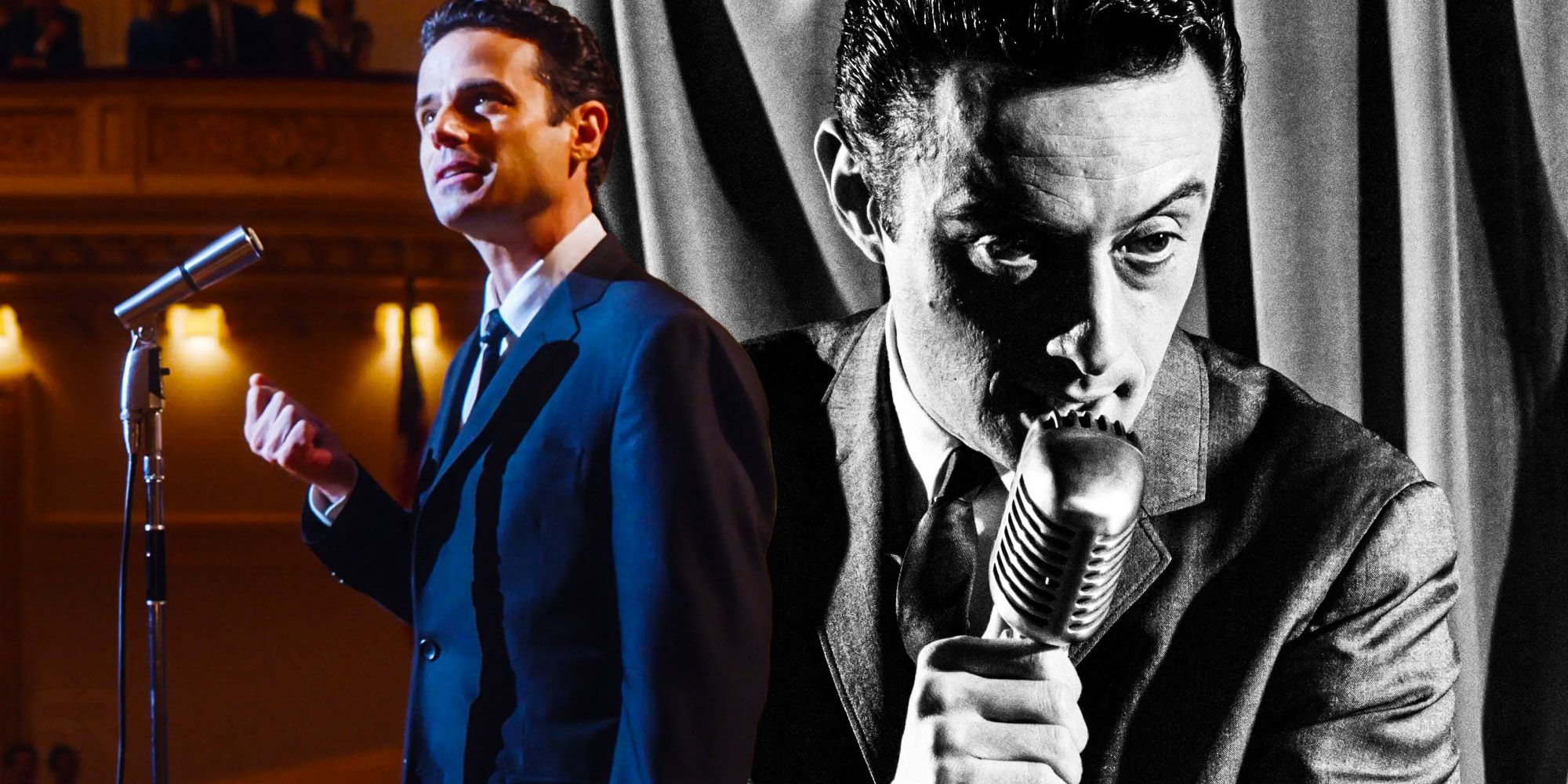
Lenny Bruce was a top comedian who shook up the comedy scene. At first, he performed in small places like strip clubs. He took on tough topics like religion, sex, and drugs. This made him not so welcome in mainstream entertainment. He was even arrested for his jokes.
His comedy was revolutionary, breaking down society’s walls. Bruce wasn’t just telling jokes. He was showing the world its flaws through humor.
“If you can’t say ‘fuck’ you can’t say, ‘Fuck the government.'” – Lenny Bruce
Bruce didn’t let censorship stop him. His fights over free speech showed the world the power of words. He fought for his right to speak freely, no matter the cost. His influence on comedy and society is still felt today.
In 1966, Bruce died young from a drug overdose at age 40. His passing showed how far he was willing to go for his beliefs. He remains a true pioneer in comedy, remembered for his courage.
Lenny Bruce changed the comedy world forever. His boldness inspired comics to speak up on important issues. He fought for free speech and civil liberties. Today, he’s still an example for those who want to make a difference through laughter.
Comedy in the 1970s and Beyond
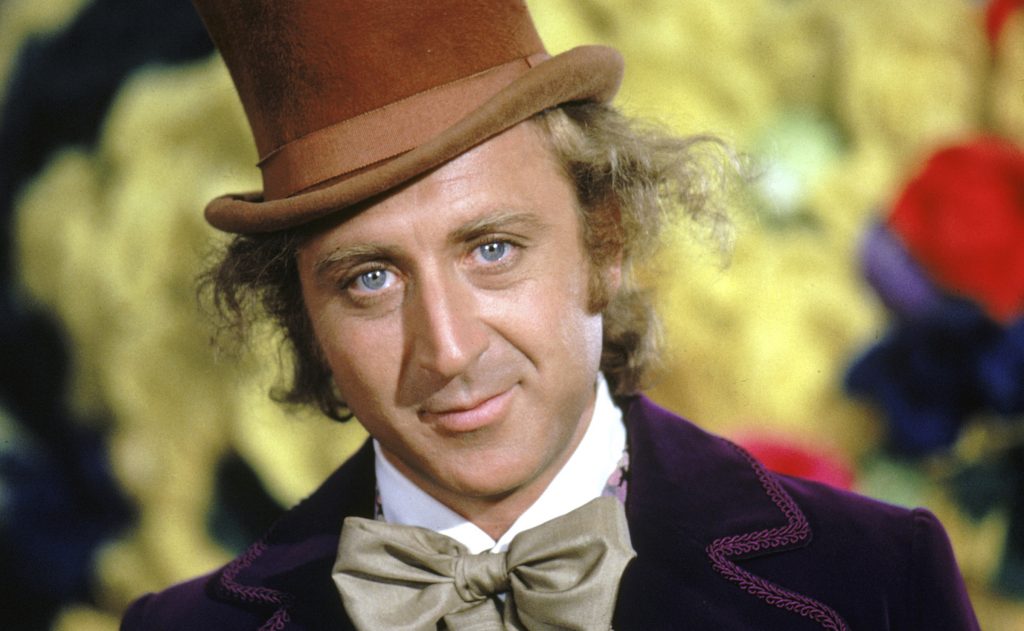
The 1970s were a turning point in comedy. A new group of comedians started talking about real issues. They spoke openly about topics like race, class, and social problems. Icons like Richard Pryor and Eddie Murphy led the way with their personal stories.
Richard Pryor was fearless in his comedy. He talked about the struggles African Americans face, like police violence and drug problems. He made the audience think about social issues through his jokes.
“I’m not going to censor myself to comfort your ignorance.”
– Richard Pryor
Eddie Murphy carried the torch in the 1970s. In 1983, his show “Delirious” took on tough topics like homophobia and gender stereotypes. With his brave humor, he made a big impact.
After the 1970s, comedy kept evolving. Comedians started to talk about current events and big issues. They made us laugh while making us think about our society. Comedy became a way to discuss serious topics in a light-hearted way.
Today, we still feel the influence of the 1970s greats like Pryor and Murphy. New comedians are carrying on their legacy. They’re not afraid to discuss difficult topics. Their comedy helps us understand and deal with the big problems in our world.
Comedy on Television
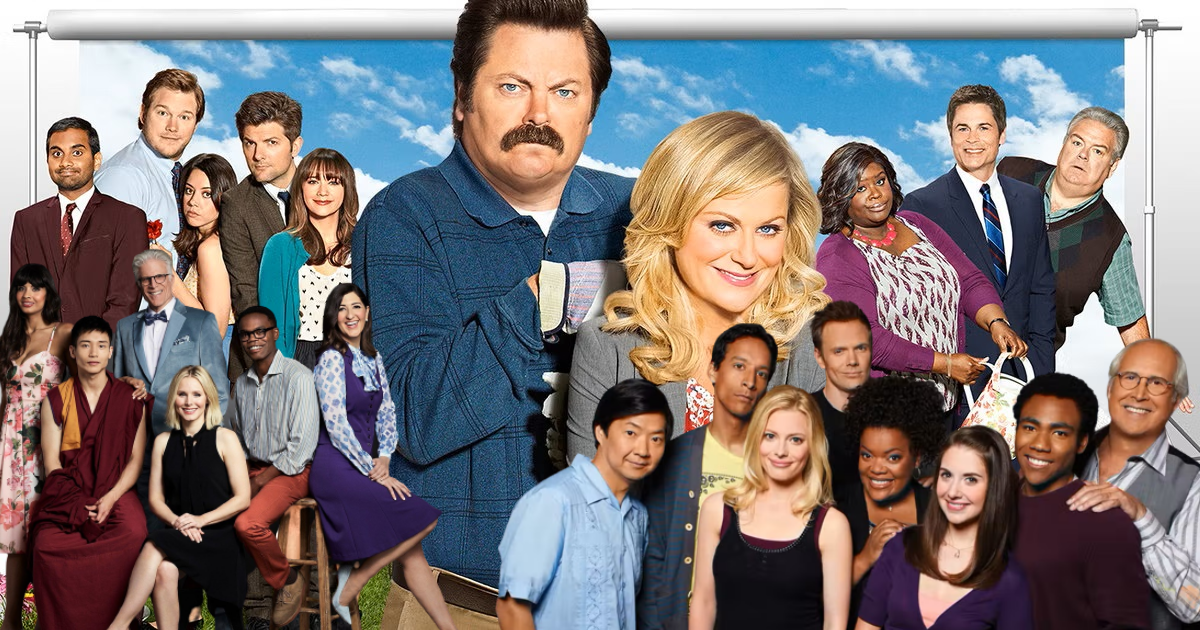
Television brought comedy to millions of homes, making it a favorite pastime. Shows like “Saturday Night Live” and classics such as “I Love Lucy” and “The Office” made us laugh. They mixed fun jokes with funny and often relatable life stories.
Sketch Comedy Shows and Sitcoms
“Saturday Night Live” has been making us laugh since the 1970s. It has a great mix of funny skits by a cast of talented performers. This blend of quick jokes and social remarks has helped many comedians become stars.
Then, there are sitcoms, which have been around for a long time. Shows like “I Love Lucy” and “The Office” are classics. They share hilarious stories about everyday people. These shows mix funny actions with clever words and often teach us something about life.
| Sketch Comedy Shows | Sitcoms |
|---|---|
|
|
These two types of comedy have changed TV. They let comedians talk about big issues in a funny way. “Saturday Night Live” and sitcoms have challenged what’s funny and taught us a lot with their humor.
“Comedy is the last refuge of the brave.” – Lenny Bruce
Television is always changing, and comedy with it. With shows like “Saturday Night Live” and classic sitcoms, TV has shaped how we see comedy. It has made us appreciate the clever and funny ways that stories are told.
The Influence of Comedy on Society
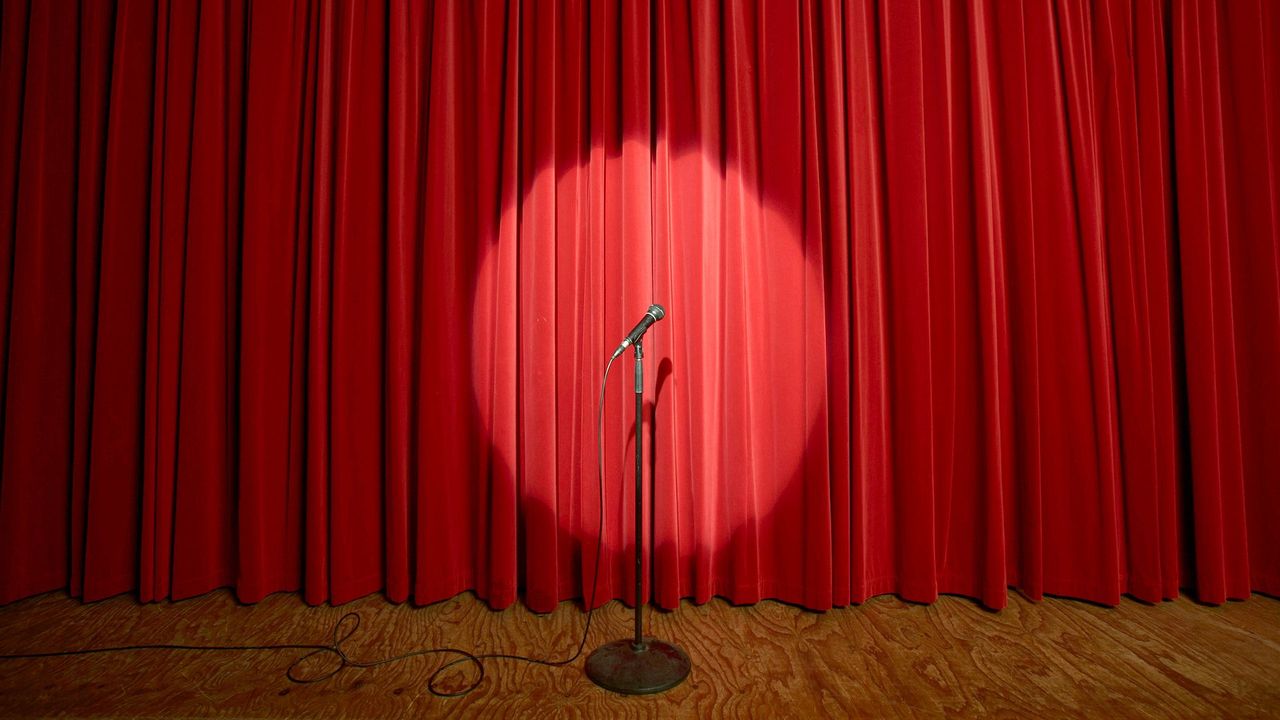
Comedy has always been more than jokes. It has a big impact on people and society rest of their lives. It helps us talk about serious things through humor. From ancient times to today, comedians have used laughter to spark discussion and change.
Comedy makes us laugh but also think. By poking fun at problems in society watch comedy central, it shines a light on what needs to change. The ancient Greek plays and modern stand-up shows are both examples of how comedy can influence us. It shows through jokes on serious topics, like politics or social issues.
Today, comedians keep using their voice to talk about what’s happening. They make us look at issues in a new light, tackling big topics like racism and climate change. Through laughter, they inspire us to make the world a better place.
But, the impact of comedy goes even further. It keeps our stories and jokes alive, showing the lives of different people. Sometimes, it helps break down wrong ideas by showing the truth in a funny way.
“Comedy is a way of looking at life, at pain. It’s a way of surviving and saying the truth.”
– Lenny Bruce
As our world faces hard times, the role of best comedy movies is more important than ever. It’s a voice that can point out faults, make us laugh, and inspire change.
| Era | Comedic Influence | Example |
|---|---|---|
| Ancient Greece | Addressing societal issues | Aristophanes’ plays |
| Elizabethan Era | Challenging cultural norms | Shakespeare’s comedies |
| 20th Century | Pushing boundaries and provoking change | Lenny Bruce’s controversial comedy |
Comedy and Changing Social Norms
Comedy central series has changed a lot over time. It often makes fun of what’s normal, leading to big talks about what’s okay. Comedians talk about things like sexism and harassment to make people think differently.
Controversial and Boundary-Pushing Comedy
Some comics, such as Lenny Bruce, got in trouble for using dirty words and talking about hard subjects. They made us think about what we can say and what we can’t. Iliza Shlesinger and Michelle Wolf also touch on hard topics today longer available on this website. They show how comedy can help us see the world in new ways.
“Comedy is a way of looking at life, at the human condition. It’s a way of dealing with the vagaries of our existence.”
Comedy changes as society does make you laugh. With time, our values and norms also change. Comedians like to test what’s okay to talk about. This can lead to big arguments about comedy and what it should be allowed to do.
Some jokes can bring big consequences. Comics who try to change things might get shut down. But, many say this kind of comedy is very needed. It helps us talk about important stuff and make things better. The way comedy affects society and what it should or shouldn’t say is an ongoing topic. This discussion won’t end as long as we keep changing and growing.
Also Read : 7 Easy Ways To Combat Pollution In Your Own Space
Conclusion
Comedy has come a long way from its birth in ancient Greece to today’s big stage. It has always been more than just making people laugh production and distribution. It has challenged how we think and what we believe, making us look at the world in new ways series are no longer available.
Even as times change and technology advances, comedy stays at the forefront. It keeps making us laugh, think, and sometimes even change our minds. This shows its lasting impact not just on entertainment, but also on how we see the world around us.
The story of comedy’s growth and change shows the power of humor and our shared humanity. Looking ahead, we can’t wait to see where comedy goes next. We hope it will keep making us laugh and think, inspiring us to see the world with new eyes.
FAQs
Q: When did comedy become popular in entertainment?
A: Comedy has been a popular form of entertainment for centuries, with its roots dating back to ancient civilizations. However, modern comedy as we know it today started gaining popularity in the early 20th century with the rise of silent film comedians like Charlie Chaplin and the vaudeville acts of comedians like Abbott and Costello.
Q: What are some popular comedy movies?
A: Some popular comedy movies include classics like “Abbott and Costello Meet Frankenstein,” modern hits like “Bridesmaids,” and beloved romantic comedies like “When Harry Met Sally.”
Q: Who are some well-known comedians in the industry?
A: There are many well-known comedians in the industry, such as Jim Gaffigan, Jim Carrey, and Sacha Baron Cohen. Additionally, comedians like Jon Stewart have made names for themselves through their work on shows like “The Daily Show.”
Q: Where can I watch comedy series online?
A: You can watch comedy series online on platforms like Comedy Central’s website, Prime Video, and Comedy Dynamics channel. Many streaming services offer a wide range of comedy series for you to enjoy.
Q: What is the significance of satire in comedy?
A: Satire plays a crucial role in comedy by using humor to critique and comment on societal issues episodes of most comedy central. Comedians often use satire to bring attention to political, social, or cultural topics in a humorous and impactful way central series are no longer.
Q: How has modern comedy evolved over the years?
A: Modern comedy has evolved to encompass a wide range of styles and genres, from slapstick and outrageous comedy to more subtle and satirical humor. With the introduction of platforms like social media and online streaming, comedians now have more avenues to reach audiences and experiment with their craft.
Q: What are some must-watch comedy shows on television?
A: Some must-watch comedy shows on television include classics like “Friends,” “The Office,” and “Seinfeld.” Additionally, newer comedy series like “Brooklyn Nine-Nine” and “The Marvelous Mrs. Maisel” have garnered critical acclaim and loyal fan bases.
Source Links
- https://en.wikipedia.org/wiki/Comedy
- https://theplaidpress.com/2018/05/25/the-evolution-of-comedy/
- https://www.britannica.com/art/stand-up-comedyComedy dates back to ancient Greek theater, making it a fundamental part of our culture. Playwrights, like Aristophanes, created comedies that highlighted social and political issues through humor. Shakespeare continued this tradition in the Elizabethan era with his joyful and touching comedies.Vaudeville and silent films ushered in a new era of entertainment in the 19th and 20th centuries. Comedians such as Bob Hope and Lenny Bruce used laughter to challenge societal norms and expand boundaries. Fast forward to today, comedy has flourished, moving from sketch comedy shows to daring stand-up performances.
Key Takeaways
- Comedy has a rich history dating back to ancient Greek theater.
- Comedic performances have evolved over time, addressing social and political issues through humor.
- Stand-up comedy and vaudeville played a significant role in the popularization of comedy in entertainment.
- Boundary-pushing comedians like Lenny Bruce have pushed the boundaries of what was considered acceptable in comedy.
- Comedy continues to evolve, addressing social norms and controversies through various mediums, from sketch comedy shows to stand-up specials.
Ancient Greek Origins of Comedy
Comedy began in ancient Greek theaters. This lively form of theater became its own style thanks to playwrights like Aristophanes. He wrote plays filled with humor and boldness, inspired by satyr plays.
Aristotle, a famous philosopher, saw comedy as one of four key writing types. He described it as a way to show people who are not so great. Comedy makes us laugh, unlike tragic stories that make us sad or afraid.
Aristophanes and the Birth of Comedy
Aristophanes shaped ancient Greek comedy. He used jokes, satire, and making fun of others in his plays. Works like “The Clouds” and “Lysistrata” often teased powerful or important people.
“Comedy aims at representing men as worse, Tragedy as better, than in actual life.” – Aristotle
Aristophanes’ plays weren’t just for laughs. They also talked about what was going on in his city, Athens. By making fun of serious things, he pointed out their problems and lies.
What Aristophanes started still influences comedy today. It spread from the Greeks to places like Elizabethan England and our current stand-up comedy.
Comedy in Elizabethan Era and Shakespeare

The Elizabethan era was a big time for comedy. This period saw a change in how comedy was seen. It became known for happy endings and a light feel, unlike the earlier serious plays. William Shakespeare played a major role in this. His works mixed smart dialogue, funny events, and a focus on love and marriage in Elizabethan comedy of manners.
Shakespeare wrote plays like “A Midsummer Night’s Dream” and “The Taming of the Shrew”. People loved these comedies for their complex stories and unforgettable characters. They also made fun of how the rich acted. This started the Elizabethan comedy of manners. Soon, romantic comedy became a favorite, making light of love’s mistakes in funny ways.
“All the world’s a stage, and all the men and women merely players.”
Back then, comedy became more popular than the sad plays of before. People wanted shows that were fun and entertaining. This trend showed a shift in what people liked to watch. The Elizabethan comedy era laid the foundation for comedy’s bright future. It prepared the ground for even funnier plays in later times.
The Evolution of Comedy Through Vaudeville

In the early 20th century, vaudeville was where comedy shined. It was filled with acts of funny songs, dances, and skits, often done by comedy teams. Yet, some like Frank Fay broke away with their own spontaneous comedy style.
Borscht Belt Comedians and Their Influence
The Catskill Mountains’ resorts, known as the “Borscht Belt,” were key in comedy’s growth. Here, Henny Youngman and others crafted witty monologues filled with jokes everyone knew. They won over audiences with their sharp humor and perfect timing.
These performers, known as Borscht Belt comedians, didn’t just perfect their art at small resort venues. They also changed comedy forever. Mixing ethnic jokes with quick gags, they laid the foundation for today’s stand-up comedy. This influenced how jokes are told by later comedians.
Vaudeville Comedy Teams Borscht Belt Comedians Abbott and Costello Henny Youngman Burns and Allen Sid Caesar The Marx Brothers Mel Brooks “I took a speed reading course and read ‘War and Peace’ in twenty minutes. It involves Russia.”
– Henny Youngman, master of the one-liner and a quintessential Borscht Belt comedian.
Bob Hope and the Rise of Stand-Up Comedy

Bob Hope really changed the comedy world. He was from Britain but made it big in the U.S. His quick, funny style made stand-up comedy a big thing in America.
Other comics back then told simple jokes. But Hope’s jokes were about what was happening then, making them connect more. This along with his likable way won over the radio listeners when he started his show in 1938.
Hope’s style influenced many comedians after him. They loved how he mixed smart humor, funny observations, and thinking on his feet. People like Lenny Bruce and Mort Sahl followed in his footsteps, changing comedy in their way.
“Comedy is an amazing calling. You get to have fun and make a living. It’s not like you’re a brain surgeon, you know.” – Bob Hope
Bob Hope’s impact on stand-up comedy can’t be overstated. He showed how to be funny and interesting, becoming a source of inspiration for new comedians for years.
The New Wave of Stand-Up Comedy

In the 1950s, a fresh group of stand-up comics broke through. They turned away from the old, lifeless ways of telling jokes. Among them was Mort Sahl, who critiqued political figures, society, and culture in a sharp way. He didn’t just tell jokes; he made people think.
His type of comedy found its place in the cool clubs of the Beat generation. These places were popular among younger people at the time. They became a source of inspiration for a whole new bunch of comedians. These comedians showed that humor could be clever, deep, and say something important about life.
Mort Sahl and Socially Engaged Comedy
Mort Sahl’s approach to comedy was a big change. Unlike others who used short jokes and punchlines, Sahl chose a more chatty, brainy style. He mixed humor with sharp observations on society, making audiences not just laugh but reflect on the world around them.
“Mort Sahl was the first comedian I’m aware of who went beyond classic joke-telling to engage with politics and social issues in a direct way.” – Comedian and writer, Jon Stewart
Sahl’s impact on comedy was huge. He cleared a path for a new kind of stand-up. These comics weren’t scared to talk about tough topics. This changed comedy for good, influencing how we see comedians and their role in society.
Lenny Bruce and Pushing Boundaries

Lenny Bruce was a top comedian who shook up the comedy scene. At first, he performed in small places like strip clubs. He took on tough topics like religion, sex, and drugs. This made him not so welcome in mainstream entertainment. He was even arrested for his jokes.
His comedy was revolutionary, breaking down society’s walls. Bruce wasn’t just telling jokes. He was showing the world its flaws through humor.
“If you can’t say ‘fuck’ you can’t say, ‘Fuck the government.'” – Lenny Bruce
Bruce didn’t let censorship stop him. His fights over free speech showed the world the power of words. He fought for his right to speak freely, no matter the cost. His influence on comedy and society is still felt today.
In 1966, Bruce died young from a drug overdose at age 40. His passing showed how far he was willing to go for his beliefs. He remains a true pioneer in comedy, remembered for his courage.
Lenny Bruce changed the comedy world forever. His boldness inspired comics to speak up on important issues. He fought for free speech and civil liberties. Today, he’s still an example for those who want to make a difference through laughter.
Comedy in the 1970s and Beyond

The 1970s were a turning point in comedy. A new group of comedians started talking about real issues. They spoke openly about topics like race, class, and social problems. Icons like Richard Pryor and Eddie Murphy led the way with their personal stories.
Richard Pryor was fearless in his comedy. He talked about the struggles African Americans face, like police violence and drug problems. He made the audience think about social issues through his jokes.
“I’m not going to censor myself to comfort your ignorance.”
– Richard PryorEddie Murphy carried the torch in the 1970s. In 1983, his show “Delirious” took on tough topics like homophobia and gender stereotypes. With his brave humor, he made a big impact.
After the 1970s, comedy kept evolving. Comedians started to talk about current events and big issues. They made us laugh while making us think about our society. Comedy became a way to discuss serious topics in a light-hearted way.
Today, we still feel the influence of the 1970s greats like Pryor and Murphy. New comedians are carrying on their legacy. They’re not afraid to discuss difficult topics. Their comedy helps us understand and deal with the big problems in our world.
Comedy on Television

Television brought comedy to millions of homes, making it a favorite pastime. Shows like “Saturday Night Live” and classics such as “I Love Lucy” and “The Office” made us laugh. They mixed fun jokes with funny and often relatable life stories.
Sketch Comedy Shows and Sitcoms
“Saturday Night Live” has been making us laugh since the 1970s. It has a great mix of funny skits by a cast of talented performers. This blend of quick jokes and social remarks has helped many comedians become stars.
Then, there are sitcoms, which have been around for a long time. Shows like “I Love Lucy” and “The Office” are classics. They share hilarious stories about everyday people. These shows mix funny actions with clever words and often teach us something about life.
Sketch Comedy Shows Sitcoms - Saturday Night Live
- Key & Peele
- Chappelle’s Show
- In Living Color
- I Love Lucy
- The Office
- Friends
- Seinfeld
These two types of comedy have changed TV. They let comedians talk about big issues in a funny way. “Saturday Night Live” and sitcoms have challenged what’s funny and taught us a lot with their humor.
“Comedy is the last refuge of the brave.” – Lenny Bruce
Television is always changing, and comedy with it. With shows like “Saturday Night Live” and classic sitcoms, TV has shaped how we see comedy. It has made us appreciate the clever and funny ways that stories are told.
The Influence of Comedy on Society

Comedy has always been more than jokes. It has a big impact on people and society rest of their lives. It helps us talk about serious things through humor. From ancient times to today, comedians have used laughter to spark discussion and change.
Comedy makes us laugh but also think. By poking fun at problems in society watch comedy central, it shines a light on what needs to change. The ancient Greek plays and modern stand-up shows are both examples of how comedy can influence us. It shows through jokes on serious topics, like politics or social issues.
Today, comedians keep using their voice to talk about what’s happening. They make us look at issues in a new light, tackling big topics like racism and climate change. Through laughter, they inspire us to make the world a better place.
But, the impact of comedy goes even further. It keeps our stories and jokes alive, showing the lives of different people. Sometimes, it helps break down wrong ideas by showing the truth in a funny way.
“Comedy is a way of looking at life, at pain. It’s a way of surviving and saying the truth.”
– Lenny BruceAs our world faces hard times, the role of best comedy movies is more important than ever. It’s a voice that can point out faults, make us laugh, and inspire change.
Era Comedic Influence Example Ancient Greece Addressing societal issues Aristophanes’ plays Elizabethan Era Challenging cultural norms Shakespeare’s comedies 20th Century Pushing boundaries and provoking change Lenny Bruce’s controversial comedy Comedy and Changing Social Norms
Comedy central series has changed a lot over time. It often makes fun of what’s normal, leading to big talks about what’s okay. Comedians talk about things like sexism and harassment to make people think differently.
Controversial and Boundary-Pushing Comedy
Some comics, such as Lenny Bruce, got in trouble for using dirty words and talking about hard subjects. They made us think about what we can say and what we can’t. Iliza Shlesinger and Michelle Wolf also touch on hard topics today longer available on this website. They show how comedy can help us see the world in new ways.
“Comedy is a way of looking at life, at the human condition. It’s a way of dealing with the vagaries of our existence.”
Comedy changes as society does make you laugh. With time, our values and norms also change. Comedians like to test what’s okay to talk about. This can lead to big arguments about comedy and what it should be allowed to do.
Some jokes can bring big consequences. Comics who try to change things might get shut down. But, many say this kind of comedy is very needed. It helps us talk about important stuff and make things better. The way comedy affects society and what it should or shouldn’t say is an ongoing topic. This discussion won’t end as long as we keep changing and growing.
Conclusion
Comedy has come a long way from its birth in ancient Greece to today’s big stage. It has always been more than just making people laugh production and distribution. It has challenged how we think and what we believe, making us look at the world in new ways series are no longer available.
Even as times change and technology advances, comedy stays at the forefront. It keeps making us laugh, think, and sometimes even change our minds. This shows its lasting impact not just on entertainment, but also on how we see the world around us.
The story of comedy’s growth and change shows the power of humor and our shared humanity. Looking ahead, we can’t wait to see where comedy goes next. We hope it will keep making us laugh and think, inspiring us to see the world with new eyes.
FAQs
Q: When did comedy become popular in entertainment?
A: Comedy has been a popular form of entertainment for centuries, with its roots dating back to ancient civilizations. However, modern comedy as we know it today started gaining popularity in the early 20th century with the rise of silent film comedians like Charlie Chaplin and the vaudeville acts of comedians like Abbott and Costello.
Q: What are some popular comedy movies?
A: Some popular comedy movies include classics like “Abbott and Costello Meet Frankenstein,” modern hits like “Bridesmaids,” and beloved romantic comedies like “When Harry Met Sally.”
Q: Who are some well-known comedians in the industry?
A: There are many well-known comedians in the industry, such as Jim Gaffigan, Jim Carrey, and Sacha Baron Cohen. Additionally, comedians like Jon Stewart have made names for themselves through their work on shows like “The Daily Show.”
Q: Where can I watch comedy series online?
A: You can watch comedy series online on platforms like Comedy Central’s website, Prime Video, and Comedy Dynamics channel. Many streaming services offer a wide range of comedy series for you to enjoy.
Q: What is the significance of satire in comedy?
A: Satire plays a crucial role in comedy by using humor to critique and comment on societal issues episodes of most comedy central. Comedians often use satire to bring attention to political, social, or cultural topics in a humorous and impactful way central series are no longer.
Q: How has modern comedy evolved over the years?
A: Modern comedy has evolved to encompass a wide range of styles and genres, from slapstick and outrageous comedy to more subtle and satirical humor. With the introduction of platforms like social media and online streaming, comedians now have more avenues to reach audiences and experiment with their craft.
Q: What are some must-watch comedy shows on television?
A: Some must-watch comedy shows on television include classics like “Friends,” “The Office,” and “Seinfeld.” Additionally, newer comedy series like “Brooklyn Nine-Nine” and “The Marvelous Mrs. Maisel” have garnered critical acclaim and loyal fan bases.
Source Links





